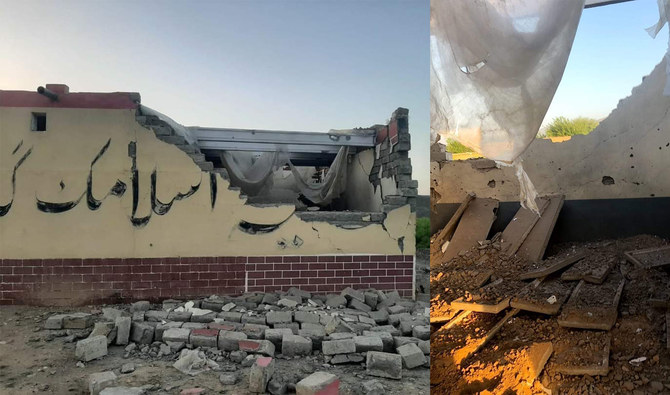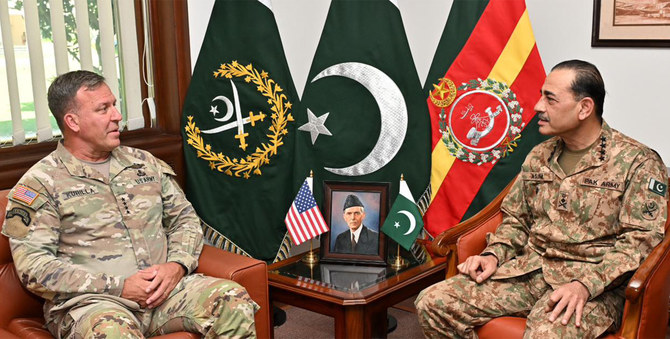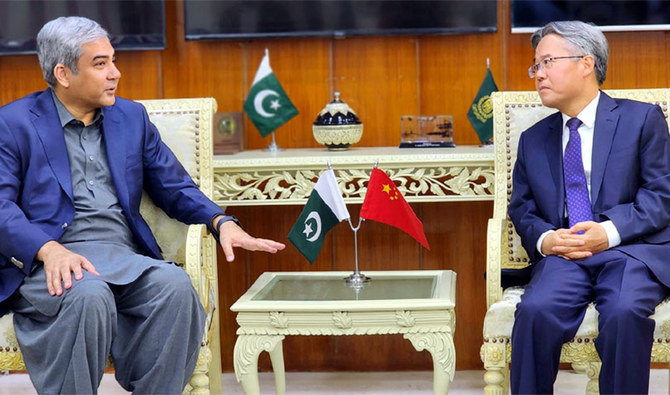ISLAMABAD: The Islamabad High Court (IHC) on Thursday indicted the capital city’s deputy commissioner and top police officials for contempt of court over prolonged detentions of members of ex-premier Imran Khan’s Pakistan Tehreek-e-Insaf (PTI) party, in what legal experts called a sign the country’s judiciary was asserting itself amid multiple violations of its orders by state authorities.
The IHC ruling came in response to multiple arrests of PTI leaders under the Maintenance of Public Order (MPO) ordinance, after they had been either released on bail or cases against them were suspended or dismissed. Under the MPO, authorities can arrest a person to maintain public order and extend the period of such detention for a period not exceeding six months at a time.
Police had arrested scores of Khan aides and hundreds of his supporters after the politician’s brief arrest on May 9 saw mob attacks on military installations and government buildings that state authorities say were ordered by Khan and his party.
Among those who were arrested were PTI leader Shehryar Afridi and Shandana Gulzar. Afridi was first arrested under Section 3 of the MPO Ordinance on May 16. Despite a release order, he was immediately rearrested under the same section on May 30.
The PTI leader was then granted bail by the Lahore High Court’s Rawalpindi bench on August 3. But his freedom was short-lived as Rawalpindi police once again took him into custody following his release. In response to the second arrest, the former minister’s lawyer filed a plea in the IHC, requesting his release as well as the revocation of the MPO order. Afridi and Gulzar have both been out on bail since August 16.
On Thursday, IHC Justice Babar Sattar indicted Islamabad Deputy Commission Irfan Nawaz Memon, Senior Superintendent of Police (SSP) operations Jamil Zafar, Superintendent of Police (SP) Farooq Buttar, and Margalla Station House Officer (SHO) Nasir Manzoor over the prolonged detentions of Afridi and Gulzar.
“If you are sentenced [for contempt], you will be sent to jail,” Justice Sattar remarked after rejecting an unconditional apology offered by the officials.
According to Pakistan’s constitution, a person convicted on contempt charges can be punished with imprisonment, which may be extended to a six-month simple imprisonment, or a fine which can be extended to Rs100,000 ($326), or both.
“It is a six-month sentence,” the judge added. “You may also live in jail and see how those who you send to jail live there.”
The Lahore High Court (LHC) has also issued a contempt of court notice to the Islamabad police chief over the re-arrest of PTI President Pervez Elahi last week. Elahi has been under arrest in a graft, among other, cases, since June but was ordered released by the court last week. He was re-arrested hours later and remains in jail.
Legal experts say Pakistani courts are empowered by law to ensure their orders are implemented and take action against violators.
“The initiation of contempt of court proceedings against Islamabad’s top officials clearly means judges are no more ready to see their orders flouted,” advocate Muhammad Ahmad Pansota told Arab News.
“This is a clear mockery of justice, what the police and authorities have been doing for the last many months now. Courts release people and the police would arrest them in clear violation of the judgments.”
Legal expert advocate Waqqas Mir said the courts had always struggled to maintain a balance of power with the executive to protect the rights of litigants.
“This [contempt of court proceeding] is a clear sign the court feels that the executive is flouting its orders,” Mir told Arab News.
“It is yet to be seen as to how far the court would go to get its order enforced or let the officials go after a warning … One can only hope constitutional liberties prevail in the end to protect the rights of the people.”
Advocate Rabbiya Bajwa said the courts were bound by the constitution to uphold and protect the fundamental rights of the public.
“Unfortunately, an environment of fear was created in the country to intimidate judges and lawyers, but this has started shedding now,” she told Arab News.
“Our judges have got the full support of the public and legal community in the dispensation of justice; therefore they should do it without any fear or favor.”















